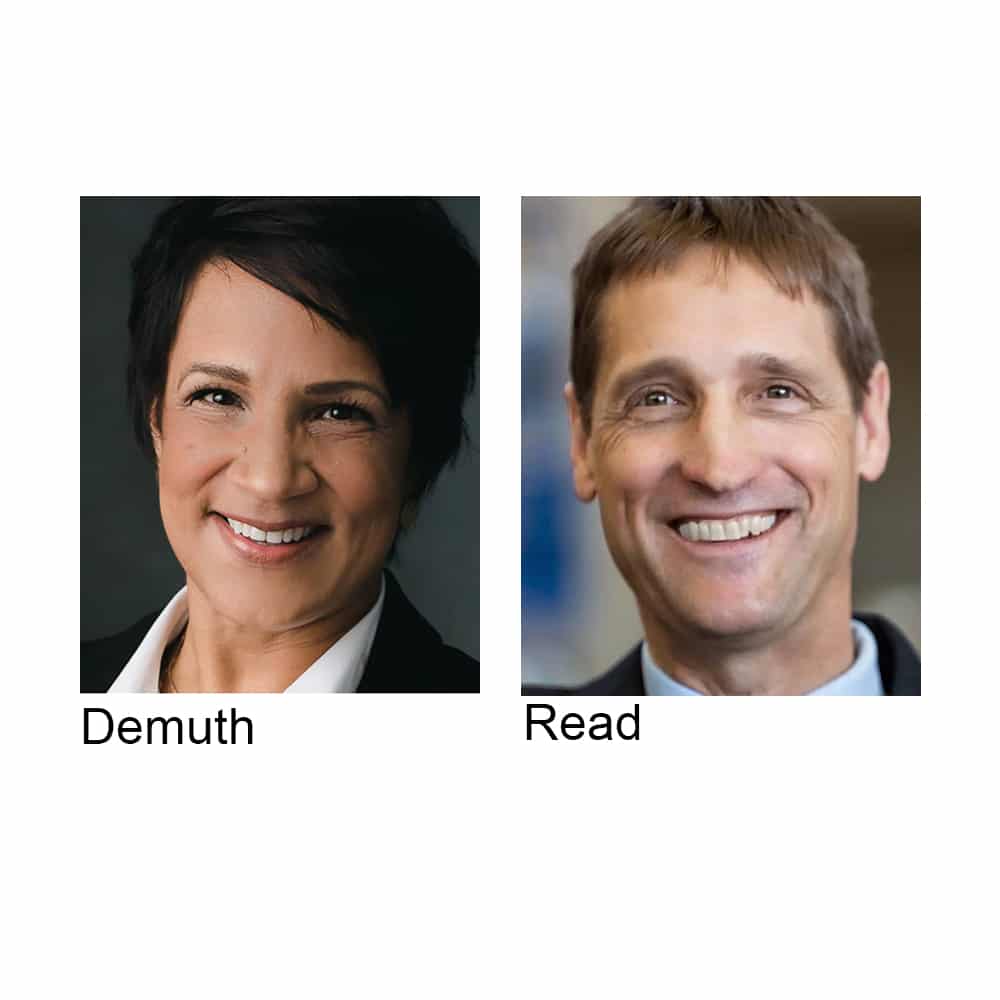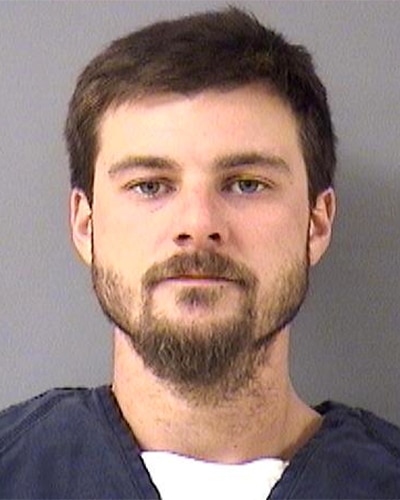by Mike Knaak
editor@thenewsleaders.com
The cost of and access to health care tops the list of key issues for both candidates running to represent District 13A in the Minnesota House of Representatives.
That’s what Republican Lisa Demuth and Democrat Jim Read say after campaigning across the district this summer.
The candidates offer different solutions to voters’ health concerns as well as how the Legislature should address school funding, economic development and voters’ concerns that the two political parties can’t work together.
The District 13A seat, which runs across south Stearns County from Lynden Township to St. Joseph and Avon west to Paynesville, is open because incumbent Republican Jeff Howe has decided to run for the Senate 13 seat against Democrat Joe Perske.
With urban, suburban and rural voters, Demuth said “District 13A is a great snapshot of Minnesota.”
Read said he’s concerned about Donald Trump and Congress dismantling the Affordable Care Act and the affect those actions will have on coverage for pre-existing conditions and premium costs.
“We are going to depend increasingly on the states to set some direction,” Read said. “I hope the state will keep in place the parts of the Affordable Care Act that are good such as coverage for pre-existing conditions.”
Demuth said the intent of MNsure is not measuring up to the original promise.
“The main thing I hear is people are concerned about cost even to get minimal coverage,” Demuth said. “We have to make sure people have the freedom to have health care and the providers they choose in an affordable manner.”
Read supports allowing everyone to buy into Minnesota Care, originally intended to help working people get insurance, and not tie health insurance to employers.
“Long term, I would like to see a program that works like Medicare. Everyone pays in. People should work and pay in,” Read said, “to take the burden off employers to provide insurance. Running a small business is hard enough, you shouldn’t have to be a health-care provider on top of that.”
Demuth, 51, has served on the Rocori school board since her election in a 2007 write-in campaign. She had already decided not to seek re-election to the school board in this year’s election when Howe asked her to run in late May when he decided to run for the Senate.
Demuth graduated from Bloomington Kennedy High School. She co-owns and manages commercial property with her husband. She founded and owns the mobile app myKin that helps users keep track of family details such as birthdays, gift ideas and clothes sizes without having to make what she calls “awkward phone calls.”
Read, 60, of Avon ran for the Legislature in 1992 and lost by 98 votes. He has taught political science at the College of St. Benedict/St. John’s University since 1988. Read’s undergraduate degree is from the University of Chicago and then he went on to Harvard University where he earned a master’s and a doctorate.
Read’s employment at CSB/SJU opened his interest in local politics, he said, with the SJU’s tradition of public service by senators Eugene McCarthy and Dave Durenberger.
Both candidates said they heard voters’ frustrations about why elected officials can’t work together. They agreed to swear off negative attacks during the campaign.
“I can’t handle the negative,” Demuth said.
Read tied his campaign approach to his decades of classroom experience.
“(Students) feel free to express their point of view and they have to give evidence,” Read said. “They can’t attack one another. I still have respect for people who disagree with me or offer a different point of view than what I’m used to. I make the point when talking with people that I encourage my students to disagree politically without being enemies.”
Those attitudes will be tested no matter who gets elected to the Legislature.
The past legislative session ended with the Republican-controlled Legislature rolling many issues into one big bill that Gov. Mark Dayton ended up vetoing. As a result, measures that were widely supported died, such as bringing Minnesota’s tax code in line with the new federal tax law, monitoring long-term care facilities and accepting $6 million to protect the state’s election systems.
Both candidates offer a different approach.
“From beginning of session, start working on the pieces,” Demuth said. “Get as much work done in the beginning. Let’s find what we can agree on and what makes sense for Minnesota.”
As a school board member she’s seen the impact of late legislation as school districts wait to see what state funding will be approved. That delays decisions on hiring teachers, staff and funding programs.
“We have to talk to each other instead of screaming at each other over the internet,” Read said. “The GOP leadership made the decision to roll everything together in one big package instead of voting separately. If the DFL gets majority, I would like to see our caucus implement voting on individual bills. There’s no excuse for making things you can work together on hostage to things you know the other side can’t support.”
Both candidates relate stories of listening to voters who have helped share their campaigns. Almost a year ago, Read embarked on a mission to knock on every door in the district, not just houses where data indicates he might find a sympathetic supporter.
“The assumption now is the data models tell you who you should talk to,” Read said. “I don’t think there’s a shortcut. It’s still for me a belief there is something good about this way of campaigning that is needed because so much of our wider political life is not healthy.”
Demuth relates a story about visiting the Collegeville Township board meeting and hearing from the supervisors about state funding to maintain roads.
“They have 37 miles of roads. The money they have available allows them to repair one mile a year,” Demuth said. “Roads aren’t gonna last 37 years.”
If elected she promises to visit every town board and city council every year.
In some parts of the district, Read says, voters talk about the lack of broadband internet access that hurts their children’s ability to do homework and farmers to run their farms.
“How can you run a 21st century farm if you don’t have access to high-speed internet,” Read asks.
Central Minnesota’s low unemployment rate ties together the issues of workforce training and economic development.
Both candidates see the need for industrial and technical training.
“Employers can’t find anybody with the skills,” Read said. “You can’t legislate work ethic but you can support a reinvestment in industrial and technical arts in high school and tech colleges. I think there’s bipartisan agreement.”
Demuth said manufacturers can’t find workers from the assembly line to the skilled trades and that policies have to encourage getting students into the trades and encouraging high schools to work with technical colleges.
Higher education doesn’t have to be four-year, she said. The challenge is funding to keep costs down to get students into technical college.
Read adds another layer to the workforce challenge and that’s health care.
“If you can fix health care so it’s less burdensome, people are more mobile. You can go to another job without losing health benefits,” Read said. “People should see the opportunities and go where the jobs are. They would give up their current job or start a business but don’t have health care.”
Read also looks to moving away from fossil fuels as an economic opportunity.
“Climate change is real,” Read said. “Minnesota has shown you can transition to solar and wind in ways that employ lots of people. It’s an economic opportunity, not a sacrifice.”
Read criticized Republican plans for roads and bridges by transferring money out of the general fund.
“That’s going to come at the expenses of education” Read said. “There are other ways to fund roads and bridges and gas tax revenues have dropped.”
At a forum focusing on educational issues organized by the St. Cloud school district, candidates were questioned on specific education legislation.
Candidates were asked to share an issue or idea to improve education. Demuth said she’d work to equalize the state funding formula and also work to encourage partnerships with local businesses. Read said he’d like to help recruit more teachers by eliminating student loan burdens for young teachers.
The candidates disagreed on providing vouchers for private schools. Read is opposed to vouchers. Demuth said she’d support a voucher system if the private schools were required to meet the same mandates and standards as public schools.
Demuth, who was born in Paynesville, looks forward to getting elected and representing her hometown.
Members of the House are elected for two-year terms and are paid $45,000 per year.




